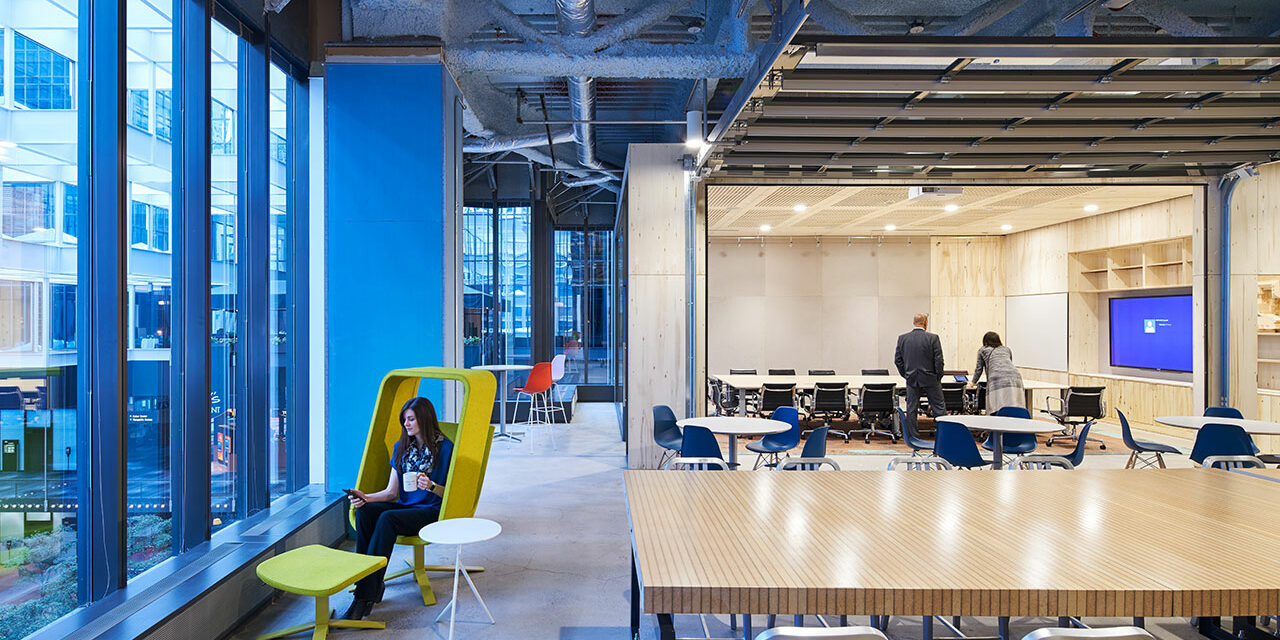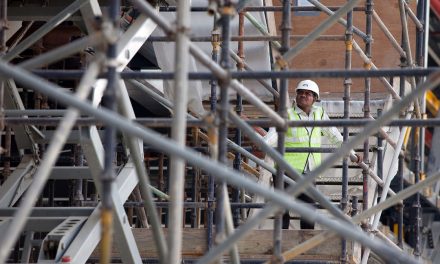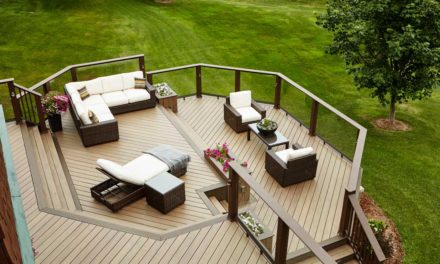Perkins+Will’s StudioIDS holds community at its core in new, award-winning office
(April 25, 2019 — Washington, D.C.) — The American Society of Interior Designers (ASID) has released the fifth case study in its Impact of Design Series featuring an innovative office space that blends community and productivity.
StudioIDS, the self-designed home of Perkins+Will in Minneapolis, was recently recognized as one of the winners of the first-ever ASID Outcome of Design Awards, honoring its successful use of pre- and post-occupancy research to prove the power of design. As evidenced in the new case study, studioIDS serves its occupants by offering a uniquely flexible space reflective of modern work styles.
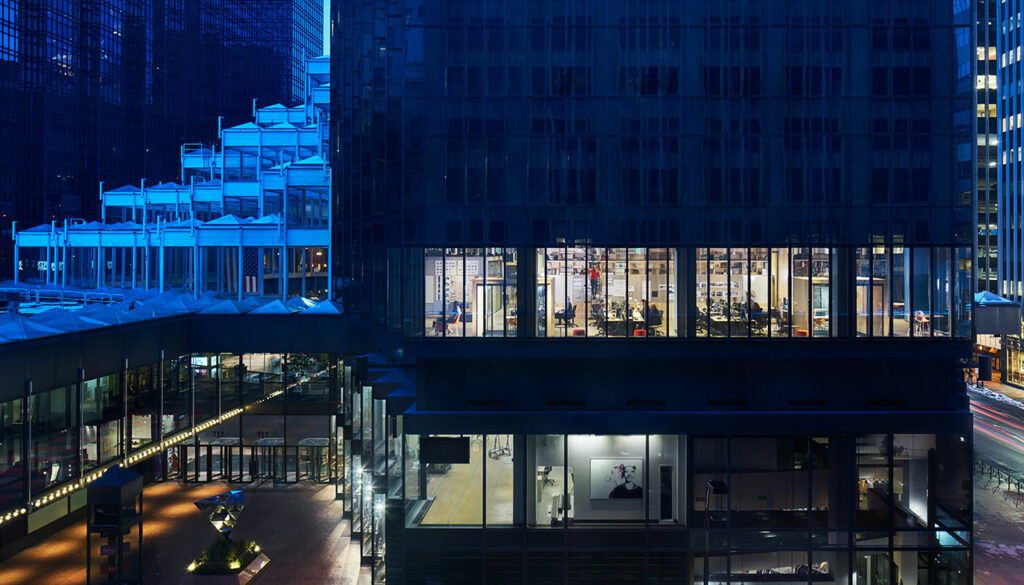
Courtesy of Perkins+Will
For its new office, studioIDS prioritized people (a sense of collaboration), place (a space that communicates the firm’s culture and mission), planet (a low environmental impact), technology (the latest innovations), and leaders (a working, mobile office experience that enables the staff to better understand their clients).
The firm focuses on a broad range of design, including landscape architecture, planning, and interior for healthcare, corporate, commercial, civic, and higher education, among others. The new studioIDS was designed with this eclectic spirit in mind, fostering a sense of creativity and community with a special focus on making thoughtful design decisions that positively impact both the environment and the rest of the world.
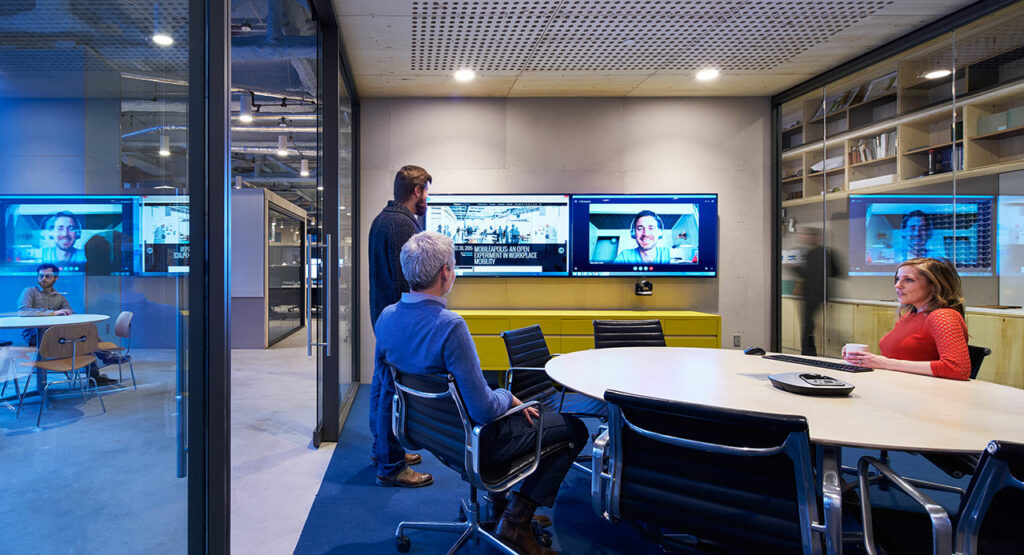
Courtesy of Perkins+Will
“StudioIDS challenges the conventional workplace model,” remarks Randy Fiser, ASID CEO, Hon. FASID. “These thought leaders looked beyond the office space itself, to its impact on employee happiness and success, the surrounding community, and the environment. We applaud their dedication to the tangible effect that design has on its occupants, and we are thrilled to see how this goal extends to their own clients and beyond.”
To solve their unique design challenges and goals, studioIDS implemented the following key elements:
Participatory Design Approach
The design process engaged all employees. The team’s goal was to create a living laboratory to track pre- and post-occupancy results to better understand successes and areas for improvement.
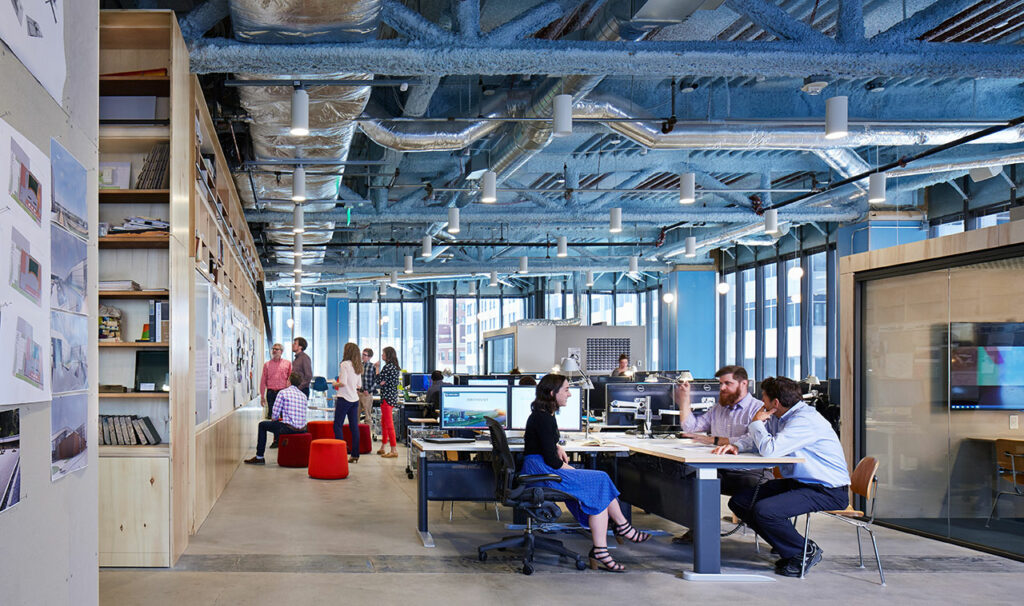
Courtesy of Perkins+Will
Free Address System
This inherently flexible model enables users to adapt, define, and self-organize their workspaces as needed. The implementation of this system makes the space a “living laboratory” not only for design, but also for workplace strategies and innovation.
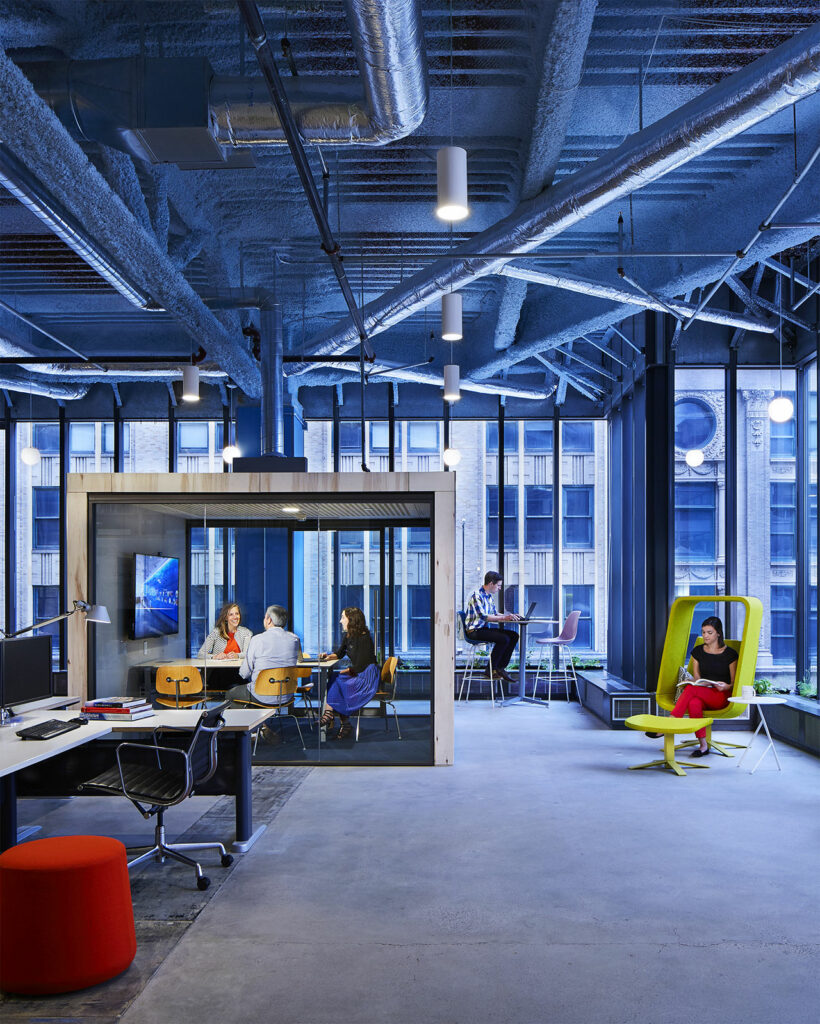
Courtesy of Perkins+Will
Restrained Material Palette
The design team used five core materials that are rapidly renewable and have toxin-free qualities: Aspen plywood, ceramic marker boards, homasote tackable surface, glass, and carpet.
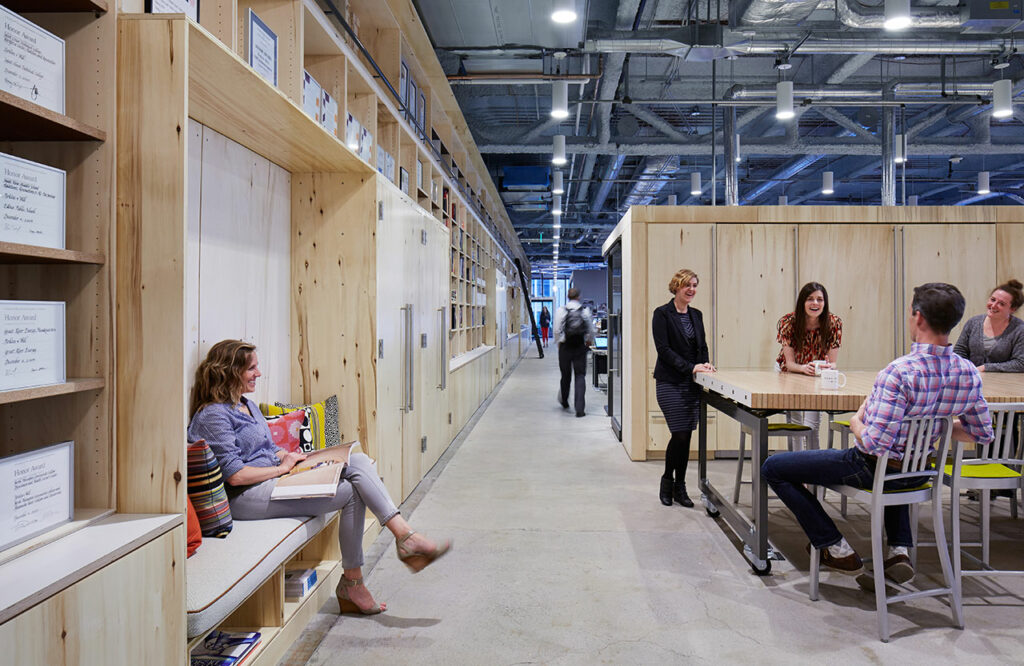
Courtesy of Perkins+Will
Salvaged Materials
Materials from the previous office were used to make adjustable shelving and large harvest tabletops, and millwork was reused in the print and model shop rooms.
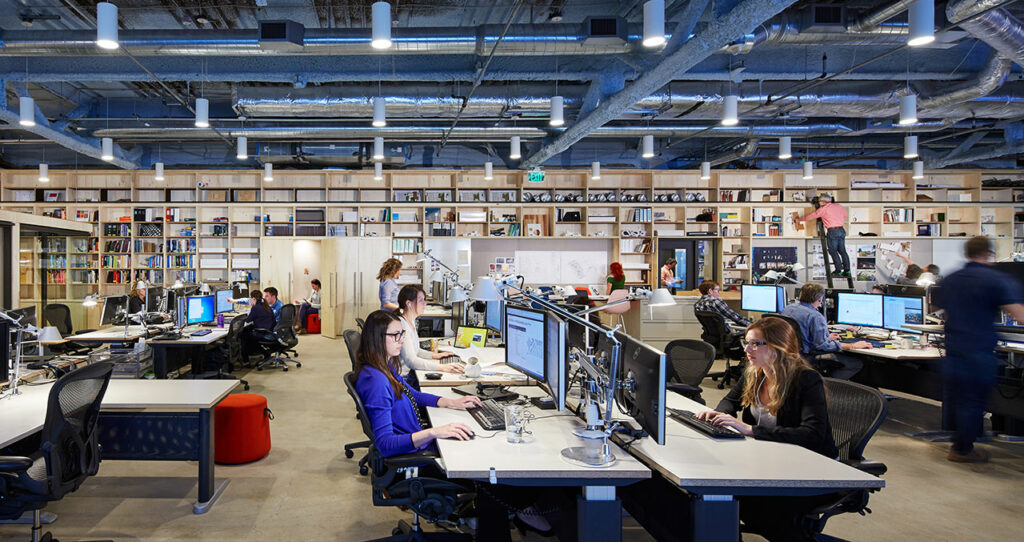
Courtesy of Perkins+Will
Social Cohesion
StudioIDS established a partnership with a Minneapolis-based furniture maker and specified a custom area rug from Arzu, a company that employs women and provides healthcare and education to them and their families in developing areas of Afghanistan.
StudioIDS conducted research on the space and its employees to understand the true impact of the office’s new design. Their successful design reduced square footage from 391 square feet per person to 130 square feet per person and reused 16 percent of construction materials and 68 percent of furniture. 55 percent of materials were manufactured within 500 miles of the office, and 97 percent of new wood used was FSC certified.
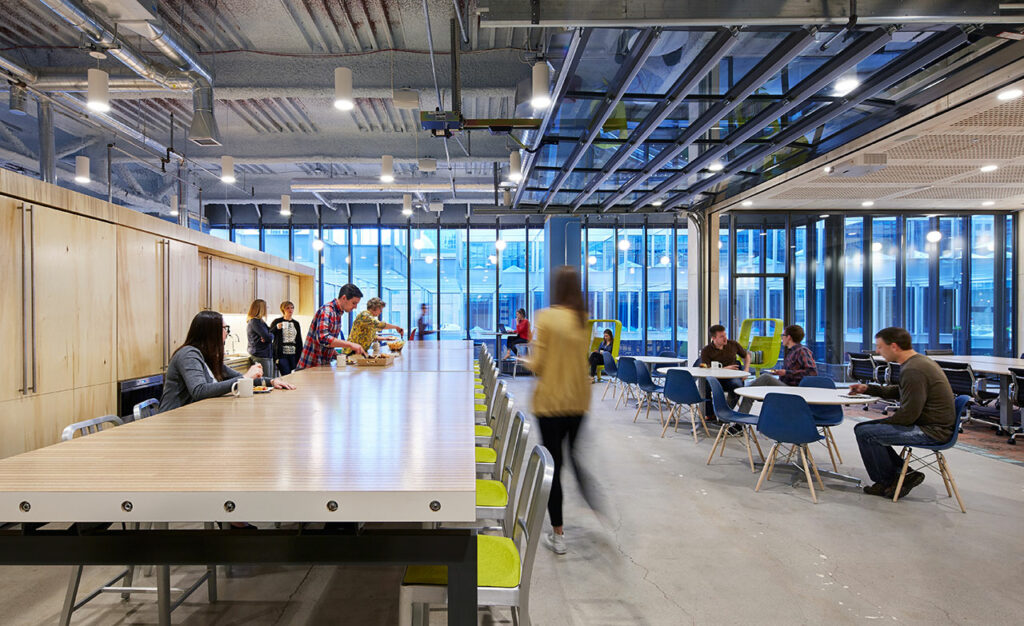
Courtesy of Perkins+Will
Additionally, the project had a lighting power reduction of 57 percent over the LEED code baseline with 100 percent LED lighting, and it used low-flow fixtures to result in a 77 percent reduction in water use. Employees reported a 40 percent increase in their ability to concentrate and a 43 percent increase in their ability to collaborate, thanks to the most utilized spaces: a large conference room at 72 percent and the community cafe at 51 percent. Beyond productivity, employees reported a 61 percent increase in sense of community and a 62 percent increase in sense of energy and buzz.
Learn more and download the case brief here.
About ASID
The American Society of Interior Designers believes that design transforms lives. ASID serves the full range of the interior design profession and practice through the Society’s programs, networks, and advocacy. We thrive on the strength of cross-functional and interdisciplinary relationships among designers of all specialties, including workplace, healthcare, retail and hospitality, education, institutional, and residential. We lead interior designers in shared conversations around topics that matter: from evidence-based and human-centric design to social responsibility, well-being, and sustainability. We showcase the impact of design on the human experience and the value interior designers provide.
ASID was founded over 40 years ago when two organizations became one, but its legacy dates back to the early 1930s. As we celebrate nearly 85 years of industry leadership, we are leading the future of interior design, continuing to integrate the advantages of local connections with national reach, of small firms with big, and of the places we live with the places we work, play, and heal. Learn more at asid.org.
About Perkins+Will
Perkins+Will is an interdisciplinary, research-based architecture and design firm established in 1935 and founded on the belief that design has the power to transform lives and enhance communities. Each of the firm’s 25 offices focus on local, regional, and global work in a variety of practice areas. With hundreds of award-winning projects annually, Perkins+Will is highly ranked among top global design firms. Perkins+Will is recognized as one of the industry’s preeminent sustainable design firms due to its innovative research, design tools, and expertise. The firm’s 2,500 professionals are thought leaders in developing 21st century solutions to inspire the creation of spaces in which clients and their communities work, heal, live, and learn. Social responsibility is a fundamental aspect of Perkins+Will’s culture and every year the company donates 1% of its design services to pro bono initiatives. In 2018, Fast Company ranked Perkins+Will among “The World’s Most Innovative Companies in Architecture.”

